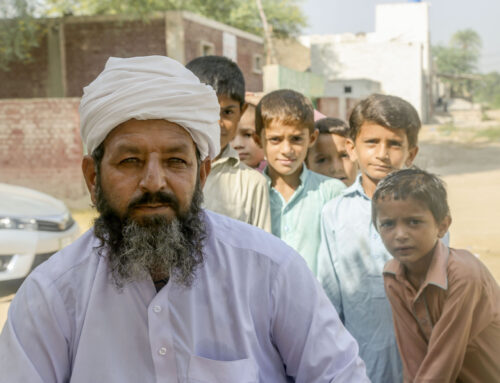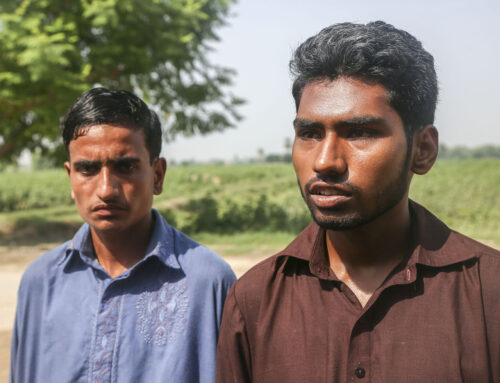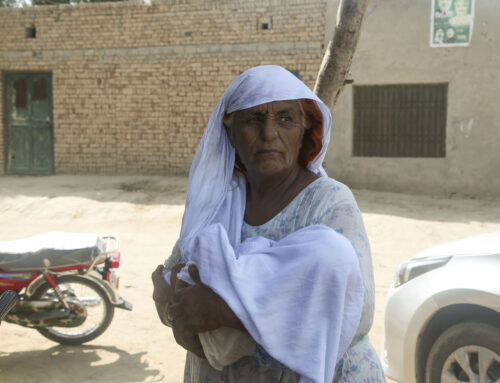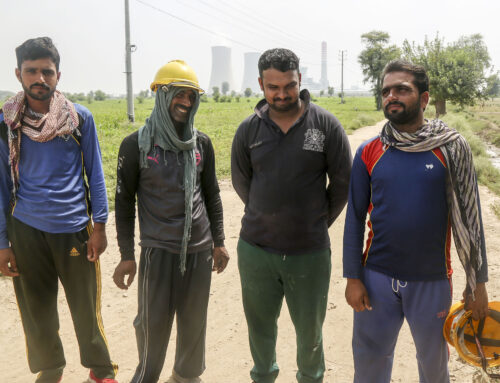“As a representative of the residents of village Chak 6-B.C. (Bahawal Canal) in the local government I can say that we’ve benefited much from the project. Not only have the prices of our lands increased manifold, we are also enjoying better security because of the special forces deployed for the safety of Chinese engineers working at the plant. We’ve also got roads and bridges, and much-needed facilities.
Muhammad Iqbal
62 years old, is a local councilor from Chak 6-BC, one of the villages lying close to the Quaid-i-Azam Solar Power Park, Bahawalpur. His parents migrated to the village, built in 1870s, after the Partition of Sub-continent in 1947. Its current population touches the mark of 6,000. Iqbal’s family comprises seven members: his mother, spouse and four children. An ex-Ranger serviceman he has been interviewed at the entrance of the Park.
Writer and Photographer: Aun Ali Jafri
Our lands have gone from zero to hero since the Quad-i-Azam Solar Power Park project was initiated in the area. The properties, which were part of Cholistan Desert, with mounds of sand and were mostly lying barren, began gaining significance when linked with the district headquarters and other towns through the road built for access to the solar park.
This also opened a source of livelihood for the unemployed people in the region. During the construction phase of the energy project, people from 25 to 30 villages in 10 miles radius of the area were hired for the construction activities. They were offered wages from 700/800 rupees (USD 4.54/5.2 dollars) per day up to 1200 rupees (USD 7.78 dollars) per day in accordance with their respective skills.
The road connectivity also helped in introducing a sort of green revolution here. For it improved supplies of seed, fertilizer and pesticides at reduced costs. The cash earned at the project was used to level or remove the sand mounds. Thus, as era of cultivation was set in at the barren lands. You can see that along both sides of the road is a strip that links the solar park with Bahawalpur (divisional and district headquarters) .Hundreds of yards of barren lands have been turned into fertile ones.
As a representative of the residents of village Chak 6-B.C. (Bahawal Canal) in the local government I can say that we’ve benefited much from the project. Not only have the prices of our lands increased manifold, we are also enjoying better security because of the special forces deployed for the safety of Chinese engineers working at the plant. We’ve also got roads and bridges, and much-needed facilities. Now our children may go to better schools in nearby towns and patients may be shifted to hospitals comparatively easily. Earlier, one had to cover long distances to find a bridge for crossing the Bahawal Canal. This would consume precious time, energies and money. The new bridges and roads have also made it possible to transport our fresh farm produce to markets and fetch a better price.
Yet another benefit of the project is that the general public has begun copying the solar energy park by installing solar panels on their lands to pump out subsoil water for irrigation purposes overcoming the water shortage problem. Some have also installed the panels at their homes to meet domestic electricity needs.
The solar park installation was completed in a record 90 days and the best thing I found with China is that they do things in record time and at the lowest costs. Whereas not a single casualty or mishap was reported during the construction and commissioning process nor did we hear about any incident. As an ex-serviceman retired from the Punjab Rangers a few years ago, I have been to several places during my postings at various destinations. I haven’t seen, in my life, a revolution taking place in such a short span of time.
The condition of the village may be further improved by offering its residents jobs at the park. We see that people from far off places, even from neighboring Sindh province, are being employed at the solar park, while those from the adjacent villages, like ours, are not being considered for the positions. What’s being offered to the locals now is just some posts as security guards.
So far, we haven’t heard, or come to know, about any health hazard because of the energy project. We learnt that it’s a safe renewable energy program unlike the dirty coal- and oil-fired plants. There are no smoke and/or emissions of other harmful gases. However, some feel that the energy plants has led to increase in the local temperatures. There are fears among the locals that their lands will begin losing fertility or that their crops will burn and give reduced yields because of the hike in temperatures. Though these are just wild guesses, as so far no effort has been made, either by the government or any private institution, to research and substantiate the claims with properly recorded data.




